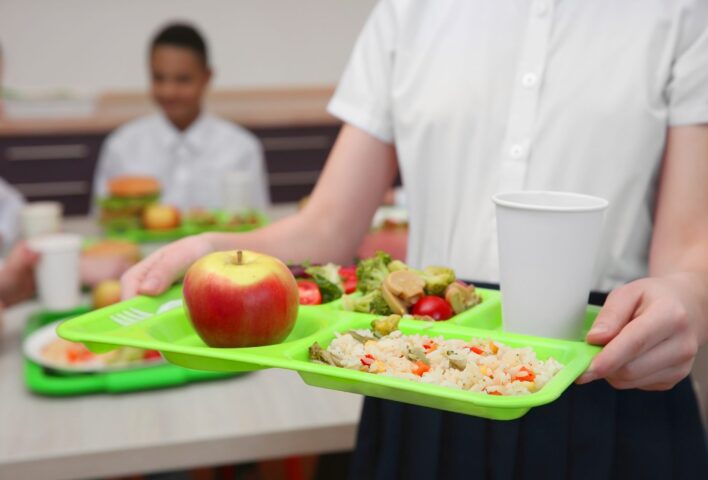School food: good or bad? How vegetarian and vegan school meal provision still needs fixing
Jen Elford, our Head of Policy and External Affairs, explores what’s needed to bring vegetarian and vegan school provision up to standard.

Hands up who hasn’t eaten a school lunch? Only those of us who popped home at dinner time, or plumped solidly for the packed lunch box, or perhaps were homeschooled, might say no to this question, which makes eating a school meal a pretty much near-universal experience.
A good school dinner should be at the heart of a school day, and there are schools which put a real emphasis on serving good food. Often, it’s in these schools, that the message about good food in the classroom is synchronised with the quality of food in the canteen. The importance of good food and nourishment to educational attainment has been well-documented in recent years, but since school meals were instituted in 1944, the reputation of school food has had its ups and downs.
Privatisation in the 1980s hit provision hard with quality tumbling. By the 90s studies showed that, in comparison, children were better nourished, and had a healthier diet, in the 1940s and 50s. In the mid-2000s schools’ food reputation finally hit the buffers and in stepped Jamie Oliver to help sort things out. After years of wrangling and Turkey Twizzler headlines, a TV series and the Feed Me Better campaign, the issue of quality in school food was finally addressed. As a result of the campaign, mandatory School Food Standards were launched in 2015, and lunch, as they say, was fixed, at least for meat-eaters.
Today, some reports say up to 90% of children are eating a school meal every day, but scroll forward the best part of a decade from the Standards becoming a legal requirement and what we have now looks like a potentially polarised situation. On the one hand there are some trailblazing examples of excellence in choice and quality in vegetarian and vegan school food, but on the other, it’s a dismal situation for some vegetarian and vegan school pupils when the dinner time bell goes.
A 2019 survey of 1,000 school pupils aged 8–16 revealed that:
77% of meat-free youngsters said that they’d had to eat meat at some point because of the lack of options available to them and
81% of parents reported there are not enough healthy and tasty vegetarian options at their children’s school.
That was the picture nearly four years ago, but with the cost-of-living crisis now upon us, and reports that schools are potentially at risk of bankruptcy, the quality of school food is only set to be further at risk as budgets are squeezed.
Bite Back 2030, a hard-hitting campaign lead by its teenage youth board, has released a report called Spill The Beans that draws attention to a range of issues with plant-based school meals in particular. The report finds that choice and quality are major issues but most worryingly it uncovers a much more basic problem: that vegetarian and vegan options are simply not always being made available.
This tallies with figures from the campaign organisation Sustain which suggest only 60% of eligible schools are complying with the School Food Standards. So, what is to be done? The Food Standards Agency has, as I write, undertaken to look into issues over the Standards with a pilot project to enforce compliance. It’s just possible that Henry Dimbleby, who chaired the panel that came up with the School Food Standards might be willing to return to the table and lead an overhaul of them. If version 2.0 is to include better provision for vegetarian and vegan young people, Mr Dimbleby is going to need help, and all agencies involved will need to be made aware of the problem.
So, what is the Vegetarian Society proposing to do? Well, we are looking into what it would take to bring all vegetarian and vegan school provision up to standard across the board and to do this we are asking you, our members and supporters to get involved, starting with a survey in order to get a clear picture of the extent of the problem.
So, if you are the parent or carer, uncle, aunt, grandparent or friend of a school age vegetarian or vegan child please get onboard and urge them to share their views and experiences through our online survey below.
This survey does just what it says on the tin, it aims to collect a rounded picture of the state of our vegetarian and vegan school food. If you have a good experience to report then that’s great: good examples are crucial to a good campaign, it gives us a good story to tell and shows what’s possible. If you have a negative story to tell about school food, you are definitely not alone. Teachers, parents, concerned grandparents have all contacted us to say they are experiencing the same problems.
If you want to go the extra mile to help us get our school food work off to a great start then please share this article with friends, family, colleagues and your local community. Let’s all pull together to fix school food.
